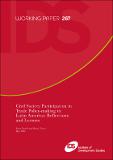Civil society participation in trade policy-making in Latin America : reflections and lessons

Download
Date
2006Author
Cox, Phyllida
Newell, Peter
Tuplin, Tracy
Tussie, Diana
Metadata
Show full item recordImpact
Abstract
This paper explores the question of civil society engagement with trade policy in Latin
America, identifying key factors which shape the dynamics and possibilities of participation.
These include (a) key strategic issues within the movements and among groups themselves;
(b) the organisation of institutional access; and (c) key economic and political regional
dynamics. The authors compare three different sets of trade negotiations and institutional
arrangements: NAFTA, Mercosur and FTAA, and examine the key drivers and shapers of
change in each case through a comparative analysis of the dynamics of the environmental,
labour and women’s movements. In examining the diverse forms of engagement and nonengagement,
lessons are derived about the possibilities of constructing more effective,
sustainable and transparent mechanisms of participation and representation in trade policy.
The paper begins with an analytical framework, followed by sections exploring and
comparing the strategies of the environmental, labour and women’s movements in trade
policy. In each case, the authors ask: Who mobilises and how, around what sort of issues?
How do the coalitions use the spaces that exist in trade arenas or protest the limitations
imposed? How do regional dynamics affect these processes? Diverse and imaginative sets
of strategies are used by groups interested in or affected by trade policy in Latin America,
which change over time, accommodating a rapidly changing context; though a key lesson
showed that merely having mechanisms of participation in place does not mean they are
used effectively. Civil society groups move in and out of policy spaces and shift between
‘insider’ or ‘outsider’ strategies, including movement across levels and between arenas. Just
as states practice two-level games, so too civil society engages in double-edged diplomacy,
playing national and international arenas off against one another depending on the political
opportunity structures available in each and the political dynamics underpinning them.
Keywords: civil society, participation, social movements, trade, trade policy, trade unions,
women, environment.
